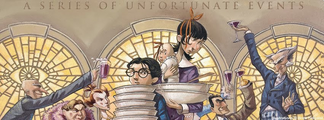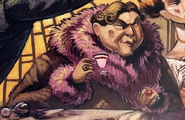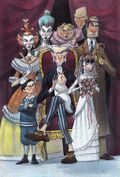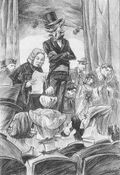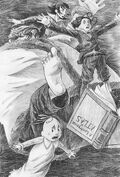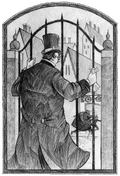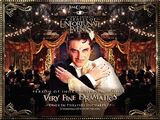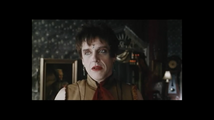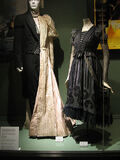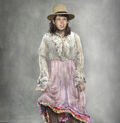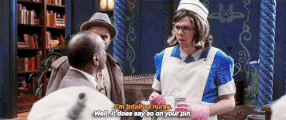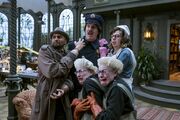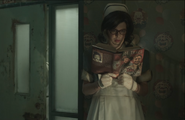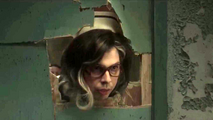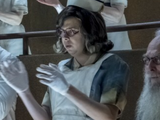| “ | I just think, even in changing context, that marriage is an inherently patriarchal construction that is likely to further the hegemonic juggernaut that's problematizing a lot of genders. | ” |
— The Henchperson of Indeterminate Gender, "The Bad Beginning: Part Two"
|
The Henchperson of Indeterminate Gender, also known as the "Enormous Androgynous Person" and the one who looked like neither a man nor a woman in the books, is an androgynous individual.
Their first appearance was in The Bad Beginning as one of Count Olaf's henchpersons. They are antagonistic to the Baudelaire orphans. They are always silent, and that causes shivers to the Baudelaires.
Biography
Early Life
Little is known about the Henchperson's life, but they became a part of Count Olaf's acting troupe and group of henchpeople, possibly implying their involvement in the fire-starting side of VFD.
They're not explicitly nonbinary, and may simply appear to be androgynous.They don't appear to speak. They are described as dangerous and treacherous.
Klaus thinks they are the scariest henchperson.[8]
The Bad Beginning
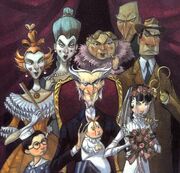
The Henchperson is one of the members of Olaf's troupe who comes to his house to have dinner prepared by Violet, Klaus and Sunny Baudelaire. The troupe gets very drunk over the dinner of Pasta Puttanesca, and then applaud Olaf after he slaps Klaus.
The Henchperson is left to guard the steps to Count Olaf's tower while he holds Sunny prisoner. Violet comes and asks if she could bring blankets, but they just look at her and shake their head.
They help Olaf with The Marvelous Marriage, and disappear with him when he escapes.
The Wide Window
The Henchperson goes with Olaf to Lake Lachrymose, and is left to guard Captain Sham’s Sailboat Rentals. They fall asleep holding the keyring to the dock, which is stolen by Sunny Baudelaire. However, the thunder awakens them, and they run after the orphans, picking up Violet and Sunny as Klaus unlocks the gate. They pick up Klaus too, about to bring them to back to the building, but they slip on Klaus's atlas and knock themselves out.
They inform Olaf of the orphans' activities, and then help him escape Arthur Poe once being caught, driving away in a minivan.
The Hostile Hospital
The Henchperson is disguised as a security guard at Heimlich Hospital, guardian Violet's room after she is kidnapped.
They give chase to the Baudelaires after they escape, leading the Volunteers Fighting Disease. They find the Baudelaires in a supply closet and break down the door just as the children escape through a window.
It is said that the children see "the fire and [the henchperson] must have reached the door at the same time," and the Henchperson does not meet the rest of the troupe outside the building and is never seen again, implying that they were killed in the fire.
2004 Film Divergent Canon
Along with the rest of the troupe, they arrive home with Olaf to find Violet and Klaus scrubbing the floor. They are wearing a brown dress and clutching a beer bottle, and appear to be drunk. One of the White-Faced Women says sarcastically that the orphans don't look rich, and the Henchperson laughs while drinking some beer. Olaf orders the orphans to make dinner for them, before the Count and his troupe walk into the entertainment room to rehearse their upcoming performance. The Henchperson sits awkwardly in between the two White-Faced Women, still clutching their now empty bottle. They watch Olaf punishing the orphans after they prepare Pasta Puttanesca instead of roast beef.
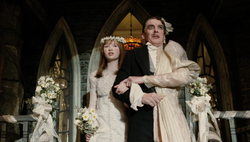
The Henchperson escorts Violet.
During the troupe's performance of The Marvelous Marriage, which was actually a scheme of Olaf's that involved him really marrying Violet and therefore gaining the Baudelaire fortune, the Henchperson walks Violet down the aisle before standing near her and Olaf for the remainder of the play. After Olaf's plan is thwarted and he is taken away by the authorities, the fate of his associates is left unclear.
They are portrayed by Craig Ferguson.
TV Series Divergent Canon
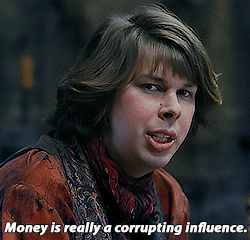
The Henchperson being insightful.
In the TV series, the Henchperson's narrative role is akin to the books, but they are portrayed rather differently as a character; the Henchperson, often using the alias "Lucafont", is portrayed as affable and far from obviously evil (being one of the only people to speak out against Count Olaf's shaming of the "freaks" at Caligari Carnival). They aren't shown as particularly enormous in width, though they are taller than the other members of the troupe with the exception of the bald man. Not only do they speak in more than grunts, they occasionally say insightful and thoughtful things which could be considered "deep", leaving many fans to call them in more modern language, "woke". They seem to be interested in LGBT activism, gender studies, and related discussions.
In "The Reptile Room: Part Two," they take the role of the Hook-Handed Man and disguise themselves as Lucafont to fool Poe into thinking Monty Montgomery's death was an accident. The children quickly see through their disguise.
They take the disguise of a gender studies professor at Prufrock Preparatory School.[9] They also help the troupe create Herring Houdini, which they use as an excuse to bid on the Red Herring statue that holds the Quagmire triplets without anyone getting suspicious.[10] They also appear with the rest of the troupe in the Village of Fowl Devotees.[11]
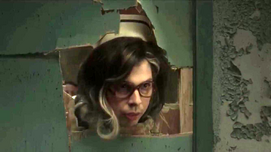
They disguise themselves again as Nurse Lucafont at Heimlich Hospital; in this canon, they survive the fire and continue to travel with Olaf and his troupe.[5] When Madame Lulu is reading the troupe, she says she has no idea what's going on with the Henchperson, which they think is fair. They also eat a corndog off the ground.[12]
The Henchperson starts to question their life choices after Hugo rants at the troupe[13] and the Man with a Beard but No Hair and Woman with Hair but No Beard appear. When the White-Faced Women decide to leave, they agree to go as well, and they leave with the sisters and the Bald Man with the Long Nose.[14] The four of them eventually become a successful theatre troupe.[2]
They are portrayed by Matty Cardarople.
Physical appearance
In the books, they are mentioned to be very overweight- "enormous." They are also described as having blank white eyes.[7]
In the film, they seem to wear pale make-up, perhaps the same the white-faced women wear, and they have rather short hair.
In the TV series, they have much longer brown hair.
Quotes
TV series
- Mr. Poe: "May I help you ma'am? Sir? Uh..."
Henchperson: "I'm nurse Lucafont."
Stefano: "Nurse Lucafont. From the local sheriff's department's medical examiner's office?"
Henchperson: "From the local..." (Stefano mouths the words) "I hear there's been a terrible accident involving a snake." - Larry: "It's Larry. I told you my name is Larry."
Hook-Handed Man: "We don't care what your name is!"
Henchperson: "Or what gender you are." - Henchperson: "Open up in there!"
Klaus: "No!"
Henchperson: "...please?" - "Here I am. Nurse Lucafont." (a Shining reference)
- "Is a personal philosophy of moral relativism the only way to survive in an ethically complex world, or is it an excuse we use to justify doing bad things?"
- "I joined Count Olaf because I thought he could teach me things, like how to harness my natural charisma into a career in the performing art, but I'm beginning to question my life choices."
- "Smoking is very very bad for you." (to Esmé)
Trivia
- In the book The Hostile Hospital, the henchperson is called an "it" in the line, "Olaf's overweight assistant had reached the supply closet and was now fumbling at the door with its enormous hands." Calling androgynous or trans people "it" is seen by many as dehumanizing and offensive, with "they/their" being a better alternative; it is also considered offensive that their androgyny is seen as monstrous. The book was written in a time when pronouns were not yet at the forefront of the gender discourse.
- This controversy resulted in Daniel Handler and the other writers of the Netflix adaptation changing the character of the henchperson to make them more human.
- While in the books it is not confirmed whether they are actually nonbinary or if they simply look androgynous, they are expressly referred to as nonbinary in the Netflix canon.[6]
- In the TV series, they mention their opinion that asparagus is more delicious than corn.
- The Henchperson's survival is due to the fact that the writers wanted Olaf to be at his highest point at the end of Season 2 in order to show his downfall better in Season 3.[15]
Appearances
Gallery
Books
Movie
TV Series
Sources
- ↑ PROSE: The Hostile Hospital
- ↑ 2.0 2.1 TV: The End
- ↑ FILM: Lemony Snicket's A Series of Unfortunate Events
- ↑ TV: The Reptile Room: Part Two
- ↑ 5.0 5.1 TV: The Hostile Hospital: Part Two
- ↑ 6.0 6.1 PROSE: The Incomplete History of Secret Organizations
- ↑ 7.0 7.1 PROSE: The Bad Beginning
- ↑ PROSE: The Wide Window
- ↑ TV: The Austere Academy: Part One
- ↑ TV: The Ersatz Elevator: Part Two
- ↑ TV: The Vile Village: Part One
- ↑ TV: The Carnivorous Carnival: Part One
- ↑ TV: The Slippery Slope: Part One
- ↑ TV: The Slippery Slope: Part Two
- ↑ Interview
| |||||||||||

